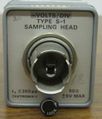GR-874 connector: Difference between revisions
No edit summary |
No edit summary |
||
| Line 1: | Line 1: | ||
[[File:Gr874 connector.jpg|250px|thumb|right]] | [[File:Gr874 connector.jpg|250px|thumb|right]] | ||
'''General Radio 874 (GR-874)''' connectors are hermaphroditic (asexual) coaxial RF connectors developed | '''General Radio 874 (GR-874)''' connectors are hermaphroditic (asexual) coaxial RF connectors developed by [[wikipedia:Eduard Karplus|Eduard Karplus]] at [[General Radio]] in the late 1940s, initially for applications up to "4500 Mc" (4.5 GHz). | ||
by [[General Radio]] in the late 1940s, initially for applications up to "4500 Mc" (4.5 GHz). | |||
GR-874 connectors are carefully engineered to keep a constant impedance throughout the signal path, by varying connector diameters between free-air | GR-874 connectors are carefully engineered to keep a constant impedance throughout the signal path, by varying connector diameters between free-air and dielectrically supported sections. These connectors therefore exhibit very little reflection and are well suited for gigahertz and pulse applications. | ||
and dielectrically supported sections. These connectors therefore exhibit very little reflection and are well suited for gigahertz and pulse applications. | |||
Most GR-874 connectors came in 50 Ω impedance. Versions for 75 Ω and 125 Ω were also available using the same ground shield and housing, but different (thinner) center pin geometry. The Tektronix [[519]] uses the 125 Ω GR-874 variant. | |||
but different (thinner) center pin geometry. The Tektronix [[519]] uses the 125 Ω GR-874 variant. | |||
The regular 50 Ω version is used in the [[1S1]], [[1S2]], [[3S1]], [[3S7]], [[3T7]], [[4S1]], [[4S2]], [[5T1]], [[5T1A]], [[5T3]], [[7M11]], [[N]], [[S-1]], [[S-2]], [[106]], [[109]], [[110]], [[113]], [[191]], [[280]], [[281]], [[282]], [[P6051]], [[017-0086-00]], [[017-0088-00]], [[035-5031-00]], [[067-506]], [[067-0511-00]], [[067-0594-00]], [[067-0832-01]], and possibly others. | The regular 50 Ω version is used in the [[1S1]], [[1S2]], [[3S1]], [[3S7]], [[3T7]], [[4S1]], [[4S2]], [[5T1]], [[5T1A]], [[5T3]], [[7M11]], [[N]], [[S-1]], [[S-2]], [[106]], [[109]], [[110]], [[113]], [[191]], [[280]], [[281]], [[282]], [[P6051]], [[017-0086-00]], [[017-0088-00]], [[035-5031-00]], [[067-506]], [[067-0511-00]], [[067-0594-00]], [[067-0832-01]], and possibly others. | ||
| Line 45: | Line 42: | ||
[[Category:Coaxial connectors]] | [[Category:Coaxial connectors]] | ||
[[Category:Probe interfaces]] | [[Category:Probe interfaces]] | ||
[[Category:Introduced in 1948]] | |||
Revision as of 04:38, 22 May 2021

General Radio 874 (GR-874) connectors are hermaphroditic (asexual) coaxial RF connectors developed by Eduard Karplus at General Radio in the late 1940s, initially for applications up to "4500 Mc" (4.5 GHz).
GR-874 connectors are carefully engineered to keep a constant impedance throughout the signal path, by varying connector diameters between free-air and dielectrically supported sections. These connectors therefore exhibit very little reflection and are well suited for gigahertz and pulse applications.
Most GR-874 connectors came in 50 Ω impedance. Versions for 75 Ω and 125 Ω were also available using the same ground shield and housing, but different (thinner) center pin geometry. The Tektronix 519 uses the 125 Ω GR-874 variant.
The regular 50 Ω version is used in the 1S1, 1S2, 3S1, 3S7, 3T7, 4S1, 4S2, 5T1, 5T1A, 5T3, 7M11, N, S-1, S-2, 106, 109, 110, 113, 191, 280, 281, 282, P6051, 017-0086-00, 017-0088-00, 035-5031-00, 067-506, 067-0511-00, 067-0594-00, 067-0832-01, and possibly others.
Different versions of the connector have different maximum voltage ratings; 1000 V is typical. There are locking and non-locking versions.
By the 1970s, GR-874 connectors were being supplanted by SMA connectors in test equipment, see e.g. the progression from the S-1 to the S-4 sampling heads.
GR-874 connectors continue to be available through IET Labs and Max-Gain Systems.
Links
- A Radically New Coaxial Connector for the Laboratory. General Radio Experimenter, Volume XXIII No.5, October 1948
- New and Improved Coaxial Connectors. General Radio Experimenter, Volume 35 No.10, October 1961
- GR-874 Section of 1973 General Radio Catalog (PDF)
- http://en.wikipedia.org/wiki/GR_connector
- US Patent #2548457, Coaxial connector for high-frequency transmission lines. Filed 10 Jan 1947, granted 10 Apr 1951.
- MGS sales list of GR874 hardware
- 017-051/017-052/017-053/017-055 adapters
Pictures
-
-
-
GR-874 connectors on a 106 pulse generator
-
50 Ω GR-874 connector
-
125 Ω GR-874 connector
-
Two 75 Ω and one 50 Ω GR-874 connectors
-
An assortment of GR-874 connectors and adapters
-
GR-874 50 Ω Terminator
-
7M11 delay line front panel with four GR-874 connectors
-
GR-874 connector on S-1 sampling head
-
Patent drawings from US2548457










